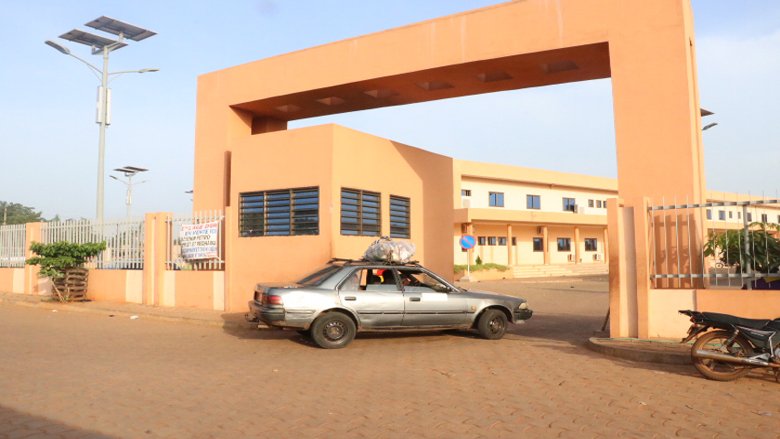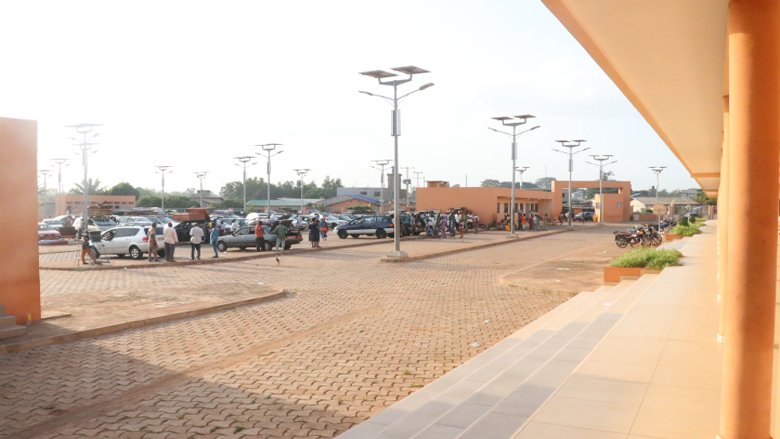Bohicon, September 30, 2022. It’s market day in Bohicon and, as usual, the paved road leading to the central bus station has been taken over by vendors set up along the road in a disorderly fashion, making access to the station difficult for taxi drivers. “We deal with this on a daily basis, but it’s worse on market days. We have no way to get to the station, and city hall and the unions are hounding us for picking up passengers outside the designated pickup areas,” laments Gutemberg, a taxi driver. He has served this station for more than 25 years and has seen his work base deteriorate over the years. “Whenever it rains, water and mud are everywhere. There are no toilets, no lights. And it’s extremely unsafe at nights,” he explains. Justin Kinkponwé, president of Benin’s National Union of Democratic Drivers (UNACODEB), Bohicon Central Station section, adds: “On average, 500 taxis pick up passengers or pass through every day. Because many customers were put off by the dilapidated state and inaccessibility of the bus station, drivers picked up passengers outside the designated pickup areas. As a result, these taxi drivers are being impoverished and the municipality is losing revenue.”
Benin Cities Support Project (PAURAD).
STORY HIGHLIGHTS
- In Benin, the enclavement and vetusty state of Bohicon’s central bus station has resulted in lost revenue for the city and its taxi drivers.
- The Benin Cities Support Project helped build a modern station, thereby improving interurban transport and boosting the municipality’s revenue.
- The new station is expected to generate more than 350 direct jobs and 5,000 indirect jobs.
Bohicon has become a major economic hub in the Zou department, and agricultural products and other goods from vendors from all over Benin are sold in its market. But because of the poor condition of the central station, the business challenges facing the city were no longer being met

Olivier Togbe / World Bank

The new bus station in Bohicon. The new modernized parking lot in Bohicon.
Olivier Togbe / World Bank
Built in the 1960s, Bohicon’s central bus station has been engulfed by the city’s central market. “Bohicon has become a major economic hub in the Zou department, and agricultural products and other goods from vendors from all over Benin are sold in its market. But because of the poor condition of the central station, the business challenges facing the city were no longer being met,” says Reine Vignalé Dansou, head of the economic affairs department at Bohicon’s city hall.
The law on decentralization in Benin entrusted the management of market units to the municipalities. Although they are one of the main sources of revenue for the municipality of Bohicon, the central station is generating an estimated CFAF 50,000 each day. For a city with more than 200,000 inhabitants, this is insufficient to cover the expenses of the municipality whose 2020-2021 budget was estimated at CFAF 1.350 billion. “It was essential to move the station, to modernize it and turn it into a real tool for the development of the city,” says Ms. Dansou.
A train station worthy of Bohicon
The cry for help from taxi drivers and the municipality was answered by the World Bank-financed Benin Cities Support Project (PAURAD). The project, which cost CFAF 1.141 billion, financed the construction of the modern station that changed the face of Bohicon.
The facility that was delivered on December 10, 2020, consists of a two levels main building that houses an administrative block, a large passenger hall, 15 shops, seven rooms to rent, two restaurants, a conference room, two bank counters, and a police station. The 200-space parking lot has secured gates, automatic barriers, and streetlights for night lighting. “This is a modern station, a first that will revolutionize intercity transport in Benin,” says Dieudonné Okpéitcha, the on-site project supervisor. The location of the infrastructure at the entrance of the city makes it the new showcase for Bohicon. For taxi drivers, this facility is welcome. “We welcomed this project with open arms. We have been involved in the process and our grievances have been taken into account,” notes Justin Kinkponwé. “The new station will have security, there will be a flat fare, and no driver will be able to justify pickups outside the designated areas,” adds Gutemberg.
For the municipality’s authorities, the economic benefits of the new station are incalculable. “The city is also getting a new commercial center with this station. In addition to transport revenues, hundreds of new jobs will be created, and the municipality will earn a lot of revenue through all the related services,” says the head of the economic affairs department.
According to estimates from the Urban Works Management Agency (AGETUR) that carried out the works under a delegated management contract, the station should generate about 350 direct jobs and more than 5,000 indirect jobs.
The municipality has entrusted its management to the autonomous State-run entity for the economic infrastructure of the Bohicon market. “We pushed for autonomous management of the station through this State-run entity because the quality of this infrastructure requires a governance model and a management structure that allow us to boost revenues and ensure maintenance of the facility,” says Ruffino d’Almeida, mayor of Bohicon. In addition to the bus station, the project supported the upgrading of the city’s bus park to facilitate the transportation of passengers.
$60 million for 10 municipalities
Closed in December 2020, PAURAD has provided $60 million to ensure access to urban services and has improved urban management in 10 cities in Benin, namely Bohicon, Abomey, Abomey-Calavi, Cotonou, Porto-Novo, Sèmè-Kpodji, Comé, Lokossa, Parakou, and Kandi. “We built community infrastructure in the 10 beneficiary municipalities, including market units, sanitation facilities, and schools. The project’s achievements have significantly changed the lives of local communities,” notes Gaston Boko, coordinator of PAURAD. The project also helped the 10 municipalities improve municipal management and supported the government’s decentralization efforts by providing assistance to municipalities with the budget transfer mechanism.
